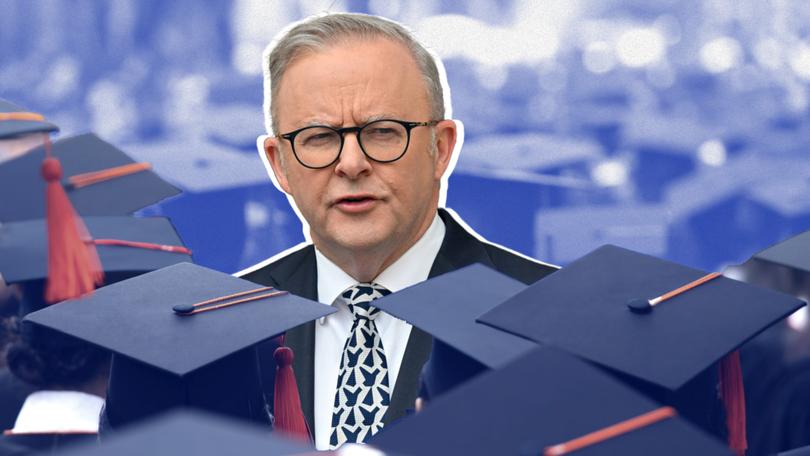HECS cuts: Albanese says scheme makes debt ‘manageable’ as warnings sound over fairness to taxpayers
The prime minister has defended plans to cut HECS debts by 20 per cent for students, after concern about how the plan would be paid for.

Cutting HECS debts will help more young people study at university, the prime minister says, despite concern taxpayers who never went to a tertiary institution will foot the bill.
The federal government unveiled an election pitch on Sunday that would cut university debts by 20 per cent for three million students.
The HECS debt changes would apply to $16 billion worth of loans, with students having the average debt of $27,600 having their bill reduced by more than $5500.
Sign up to The Nightly's newsletters.
Get the first look at the digital newspaper, curated daily stories and breaking headlines delivered to your inbox.
By continuing you agree to our Terms and Privacy Policy.Prime Minister Anthony Albanese said the changes would make the student debt levels more manageable.
“The HECS scheme was never meant to be a lifetime of debt, it was meant to be a contribution back to education,” he told ABC Radio on Monday.
“Eighty per cent of the children who are in primary school today will need either a university degree or a TAFE qualification, not as an added bonus for their employment but as a precondition to getting a job because of the changes that are happening in the economy.”
The prime minister dismissed concern surrounding the policy after leading economist Chris Richardson said the HECS cut failed the fairness test.
“For many people, the interest that they are paying on that debt is more than the original HECS payment,” Mr Albanese said.
“One of the things about university degrees, as well as TAFE qualifications, is that it doesn’t just help the individual student. It’s the key to our national economy.”
Health Minister Mark Butler dismissed concerns taxpayers would have to fork out for the changes, saying it was a worthwhile investment in the future of young people.
“It’s something we can afford as a country because we know there’s no better investment we can make than in the skills and the education of our young citizens,” he told ABC TV.
“We know young Australians are doing it really tough, particularly if they’re saddled with big, big student debts.”
Opposition frontbencher Paul Fletcher questioned how the policy would be paid for, given millions of taxpayers did not go to university themselves.
“All 27 million Australians will be required to contribute to the cost of it, but 24 million Australians will not benefit from it,” he told ABC Radio.
“The Commonwealth already pays around 60 per cent of the cost of the university student’s education, so there’s already a very significant amount being paid by taxpayers.
“What this will simply do is increase the burden on all taxpayers.”
The government had pledged the HECS cuts would be the first piece of legislation put in place if Labor wins a second term in office.
The next election must be held by May.
Nationals leader David Littleproud said the government needed to clarify how it could afford the debt-reduction measures.
“I can’t see how we can pick winners to that scale of money and support a mechanism like this in the totality of this cost-of-living crisis,” he told ABC TV.
“There are more pressing things, (such as) getting energy bills down, and we can do that quickly with more gas and a long-term policy.”
